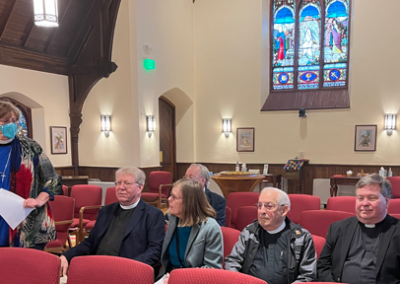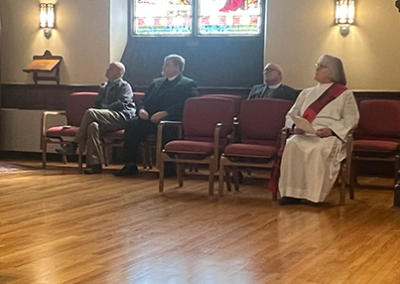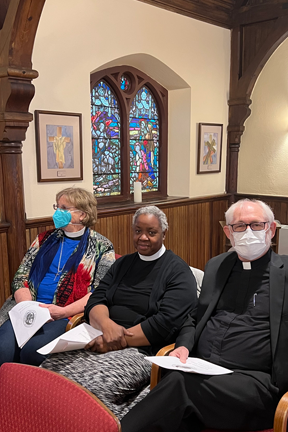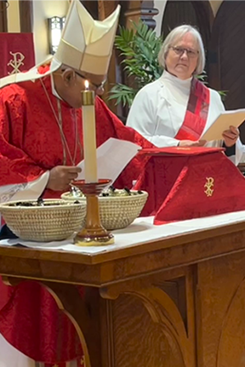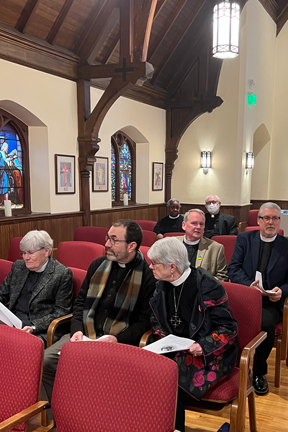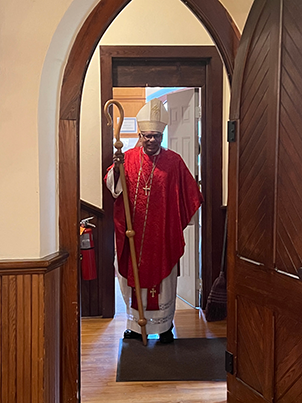About the Renewal of Vows and Blessing of Oils service
The Episcopal Church has four orders: the laity, deacons, priests, and bishops. People entering each order take vows unique to that order. For the laity, these vows are first taken at Baptism and are renewed at a Service of Confirmation. For those entering the diaconate, priesthood, or episcopate (the office or term of office for a bishop), the vows are taken at a Service of Ordination. Each year, most dioceses of The Episcopal Church gather their clergy during Holy Week for a Eucharistic liturgy that includes the prayers and promises of the renewal of their vows and the blessing of two oils.
The Renewal of Vows and Blessing of Oils service has roots dating back to 200 BCE and was a part of the liturgical reforms of the 1960s and 1970s. At one time the custom was to hold the service on Maundy Thursday, but for practical reasons in more recent times, the service now usually occurs earlier in Holy Week. Two oils are blessed during the service. One, oleum sacrum or Chrism oil, is used for baptism, and may only be blessed by a bishop in our practice. The other is oleum infirmorum or oil for the sick. Oleum infirmorum is used for anointing those who are ill or near death. This oil may be blessed by a priest, but traditionally is done by a bishop.
Bishop San’s Sermon from the Service:
“I am the Good Shepherd” (John 10:11)
By the grace and mercy of God supported by the pioneering and seminal work of scientists and sacrificial devotion and heroism of health care workers who are risking their lives, family’s health and safety, untold hours of demanding work some even sacrificed their lives, we are here gathered in person to renew the Vows we made at our ordinations. It has been a long two plus years and we are not finished with living with the ravages of this global pandemic. Nevertheless, cautiously and optimistically, we proceed with life in this new normalcy praying and hoping for a complete reversal of this ‘invisible enemy’ among us.
The biblical image of the Good Shepherd is drastically different to the one conceived of by the secular world. Whereas the secular world interprets this leadership role as one of honor, power and control, the Church is invited into the model of service from the ‘underside’ (grassroot or servanthood) to use a prominent term from Latin America’s Liberation Theology. Clergy serve a ministry that offers security to the unsecured, hope to the hopeless, inclusivity to the outcasts and disenfranchised and are defenders of God’s beloved against what the writer of I Peter 5: 7 refers to as “roaring lions seeking to devour”. The scope and calling in the ministry we serve cannot be articulated in mere words because clergy see beyond the obvious and the obvious to the common eye could be very discouraging and fatalistic.
Clergy are the keepers of the resurrection motif that defines the role we serve and defend. Clergy offer guidance that revives and restores, and continual assurance in the overwhelming confidence in the grace of God, that comes with a price. As Dieterich Bonhoeffer, the German theologian and World II prisoner wrote ‘Grace is cheap’, it is so because Jesus paid the ultimate price as such the world is the grateful beneficiary of his sacrifice.
It is often easy to get carried away by the temptation to assume we are the architect of the church’s revival or witness. This is the dangerous idolatry clergy need to guard against and this is the sentiment I am troubled by when I listen to the arrogance of some of us.
Jesus calls us to the ministry of the Good Shepherd who embodies the quintessential of this motif. The truth is nothing we do is ever ours but God’s and this type of mindfulness is what makes ministry sustaining and ego deficit.
This is how the church witnesses the Good Shepherd model embodied in Jesus who is great at using the available resources of his day to demonstrate gospel virtues and grace. In a world and church that is vociferous in their complaint, Jesus’ life demonstrates something radically different. It demonstrates that God is at God’s best when the world throws vicious darts at it message of new life, it’s timeless message that contains within it the Great Triduum, which begins on the evening of Maundy Thursday and concludes with Evening Prayer on Easter Sunday – the events of the Resurrection – the triumph of life over death. This is the vision that keeps me going these 41 years of global ministry. I have personally witnessed and humbly walked with Jesus on numerous occasions through the ‘valley of the shadow of death’ in the wisdom of Psalm 23.
One of the greatest sources of strength and comfort for any clergy person is to walk with Jesus when the rest of the world says it is impossible. We are called to profess to the world that the word of God reveals through us that, “with God nothing is impossible” (Luke 1:37).
My beloved, our lives are intertwined with the One who says, “I am the Good Shepherd.” Surely it is fitting that Christ should be a shepherd, for just as a flock is guided and fed by a shepherd so the faithful are fed by Christ with spiritual food and with his own body and blood. The Apostle said: “You were once like sheep without a shepherd, but now you have returned to the shepherd and guardian of your souls.” The prophet has said: “As a shepherd he pastures his flock.”
Christ said that the shepherd enters through the gate and that he himself is the gate as well as the shepherd. Then it is necessary that he enters through himself. By so doing, he reveals himself, and through himself he knows the Father. But we enter through him because through him we find happiness.
Take heed: no one else is the gate but Christ. Others reflect his light, but no one else is the true light. John the Baptist “was not the light, but he bore witness to the light.” It is said of Christ, however: “He was the true light that enlightens everyone.” For this reason, no one says that they are the gate; this title is Christ’s own. However, he has made others shepherds and given that office to his members; for Peter was a shepherd, and so were the other apostles and all good bishops after them. Scripture says: “I shall give you shepherds according to my own heart.” Although the bishops, deacons and priests of the Church, who are the church’s children, are all shepherds, nevertheless Christ refers only to one person in saying: “I am the Good Shepherd,” because he wants to emphasize the virtue of charity. Thus, no one can be a good shepherd unless they are one with Christ in charity. Through this we become members of the true shepherd.
The duty of a good shepherd is charity; therefore, Christ said: “The good shepherd gives their life for the sheep.” Know the difference between a good and a bad shepherd: the good shepherd cares for the welfare of the flock, but the bad shepherd cares only for personal welfare.
The Good Shepherd does not demand that shepherds lay down their lives for a real flock of sheep. But every spiritual shepherd must endure the loss of bodily life for the salvation of the flock, since the spiritual good of the flock is more important than the bodily life of the shepherd, when danger threatens the salvation of the flock. This is why the Lord says: “The good shepherd lays down his life,” that is, physical life, “for the sheep”; this the shepherd does because of the shepherd’s authority and love. Both, in fact, are required: that they should be ruled by the shepherd, and that the shepherd should love them. The first without the second is not enough.
Pope Francis observed that Jesus responded to the disciples’ question of glory offering them a fundamental teaching: “true glory” does not mean rising over others, but “experiencing the same baptism” that Jesus would receive soon in Jerusalem. As the baptism means “immersion”, Jesus with his Passion “immersed himself into death, offering his life to save us”, he explained, so His glory, God’s glory, is “love that becomes service, not power that seeks to dominate”.
Christ stands out for us as the example of this teaching: If Christ laid down his life for us, so we also ought to lay down our lives for one another. Laying down the life sometimes means being the only voice crying in the wilderness.
My beloved, I charge you that by word and action be the voice of hope, the dignity of service, the power and gift of redemption, the essence of transformation, the eye that sees what no other sees because you see through the all-seeing eye of God. And yes, you would be ridiculed and rejected but, in the end, because the glorification is God’s, it shall prevail.
The Pope asked how can we go from “rising” to “immersing ourselves”, or from an attitude of “prestige” to one of “service”. While dedication is important, we have to draw on the strength of Baptism, he said, of the “immersion in Jesus” we have already received, he pointed out, noting that this grace helps direct us to follow Him – Jesus instead of our own interests, helping us to be of service to others. He invited us all to “ask the Holy Spirit to renew the grace of Baptism in us, the immersion in Jesus, in his way of being, in service”. And may we follow the humble and loving example of Mary who can help us to be “completely immersed” in our service to the Lord and one another”.

